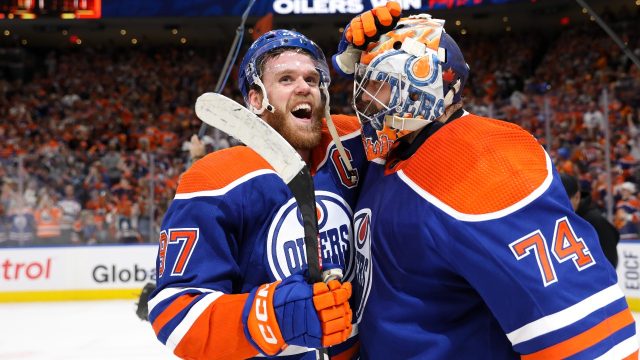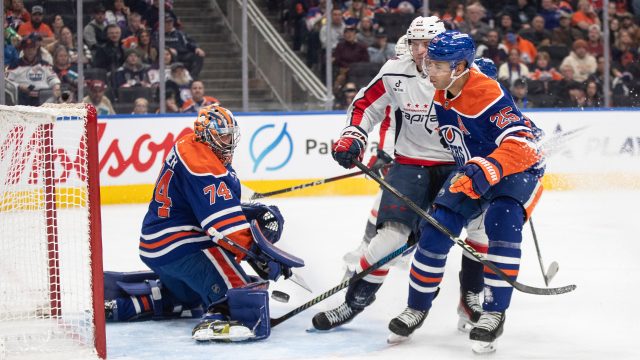
EDMONTON — It takes a deep dive into hockey culture to find the roots of Connor McDavid’s three-game suspension, a ban that has so much more depth than one cross-check to the head of a pesky Vancouver checker.
It runs back through Mario Lemieux, who so famously called the NHL a “garage league” — or a “garbage league,” depending on who you ask — when he tired of being the motor boat behind whom legions of NHL checkers water-skied.
There was Jeremy Roenick’s famous post-game conference, his lip swollen to four times its size after a missed high stick by referee Blaine Angus, when Roenick eff-bombed the League in a memorable rant over missed calls.
“They have to take responsibility for the way they referee. The National Hockey League has to step in and tell these to guys to open up their God damned eyes,” Roenick said that day, 21 years ago this month.
“Wake the (expletive) up already. It’s a joke. Wake up, NHL. Wake up!”
-

-
NHL on Sportsnet
Livestream Hockey Night in Canada, Scotiabank Wednesday Night Hockey, the Oilers, Flames, Canucks, out-of-market matchups, the Stanley Cup Playoffs and the NHL Draft.
On Wednesday it was McDavid’s turn, the Face of the Game gazing into a bank of cameras and media in the midst of a suspension rooted in the kind of wrestling match that Lemieux, Wayne Gretzky and all the greats have been subjected to in our sport — a game that has always asked its best players to ‘play through’ the hooks and the holds.
“I can’t have that reaction, obviously,” began McDavid, of his cross check to the head of Vancouver’s Conor Garland. “I know that, everyone knows that. Not the reaction that I’m proud of, or that anyone wants to see out of me.
“I understand that the refs have a hard job,” he added. “With that being said, my job’s hard too. Everyone’s got a hard job. That’s why we’re in this business.”
We won’t bore you with the many versions of “I have total respect for the refs” that McDavid peppered his comments with Wednesday. To be fair, the media wanted this avail, not McDavid. We asked the questions, and he answered them.
Like, about how the Garland mugging is an obvious penalty for 59 minutes, until it’s not anymore with the game on the line. That’s another of hockey’s ol’ chestnuts: Paul Bunyan Rules in the final 30 seconds of a one-goal game.
“I think players across the league — not just me, not just guys in this room — want to see the game called (consistently),” McDavid said. “A penalty in the first is a penalty in the third. A penalty in October is a penalty in April.”
It’s not one game, one play or one player we are talking about — or have been talking about since the days when Steve Kasper followed Gretzky around the rink with his Sherwood stapled to Gretzky’s belly. It’s a cultural thing that Daniel and Henrik Sedin faced, that Steve Yzerman faced, that Mats Sundin faced.
An even-it-up officiating culture that, this season, has resulted in the two players who have the puck in the offensive zone more than any other — McDavid and Nathan MacKinnon — on pace to draw the least penalties in a five-season window.
Or this factoid:
McDavid’s Oilers rank first in the NHL in two categories: Time with possession of the puck (19:22 per game), and time possessing the puck in the offensive zone (8:03).
Yet the Oilers rank 27th in penalties drawn, power play opportunities and power play opportunities per game played (2.49).
Now, we’re not saying they should be first. Or even fifth. Heck, top-10 wouldn’t mitigate this question.
But 27th? In a 32-team league?
Square that for us, Connor McDavid.
“That’s like trying to fit a square peg into a round hole,” he said. “It doesn’t (square), it’s not going to add up, (and) I’m not going to make it add up.
“We’re obviously going at the net a lot. We have the puck a lot. You’d think that would result in more penalties drawn, but for whatever reason, it’s not,” he said. “Just because one guy draws more (penalties) than another guy, or one team draws more than the than the other team, then that’s the way it is. If it’s four penalties to one, then it’s four penalties to one.”
In football, “The quarterback draws the most penalties,” McDavid said. “Why is that? Because he’s got the ball the most.”
Something that’s dawned on us while perusing the stats on NHL.com is that the teams that take the least penalties, often draw the least penalties.
Vegas is the NHL’s least penalized team, but they are awarded the second fewest power plays. The Islanders are the second-least penalized team, yet rank 29th in power play opportunities.
Edmonton takes the fourth-least penalties, but gets the sixth-least power plays — despite possessing the puck more than any other team.
That tells us that, if your team keeps its penalty totals low — and the officials play the “even it up” game — your reward for a clean game is fewer power plays.
It’s not the actual on-ice officials as much as the league and the general managers who have settled on this culture for decades — and are happy with it. The rule book is the standard, until the score clock says, “Move over. I’m in charge now.”
McDavid, the latest player to be asked, just wants what they all want. For the rule book to be applied through 60 minutes of hockey, 82 nights a year.
“If any player around the league is asking for anything other than that, that would be surprising,” he said. “I think that’s what fans want. I think that’s what media wants. I think that’s what the league should want.”






